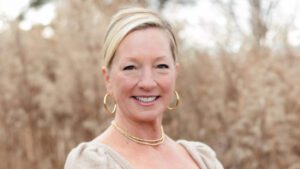Kristie Nicodemus is a respected leader in the world of business development. She is based in Atlanta, Georgia, where she works as a Senior Business Development Executive at Mercer, a Marsh McLennan company.
Kristie has built a strong career by helping companies grow through strategic relationships and smart business planning.
Her career began after earning a degree in Mass Communications from Virginia Commonwealth University. Over the years, she has worked with top firms such as Northwestern Benefit Corporation and OneDigital. Her focus has always been on client partnerships and driving results.
Kristie is known for her clear thinking and ability to connect with people. She is passionate about helping others solve problems and find new ways to succeed. Her work in employee benefits and consulting has earned her a solid reputation in her field.
Growing up in Virginia, Kristie played sports like tennis and basketball, which taught her discipline and teamwork—skills she now uses in her professional life. She enjoys fitness, travel, and reading. She also spends much of her free time volunteering. She supports local groups such as the Grant Park Conservancy, The Atlanta Botanical Gardens, and The Nicholas House.
Kristie’s story is one of steady growth and dedication. Her ability to balance her career, family, and community work makes her a role model in business. She believes in building strong partnerships, staying active, and giving back. With her experience and values, Kristie Nicodemus continues to lead by example in her industry.
In Conversation with Kristie Nicodemus: Lessons from a Career in Business Development
Q: Kristie, let’s start at the beginning. What first drew you to a career in business development?
A: Honestly, it wasn’t something I had planned early on. I studied Mass Communications at Virginia Commonwealth University, and at the time, I thought I’d go into media or advertising. My dad had a tenured and successful career in sales then leadership with AT&T. This naturally led me to follow in his footsteps. Once I got a taste of it, I knew it was the right fit.
Q: You’ve worked with several well-known companies in the employee benefits and consulting space. How did your career take shape over the years?
A: I started at Northwestern Benefit Corporation, and that was where I really began learning the ropes. It was fast-paced and relationship-driven, which suited me well. From there, I moved on to OneDigital, where I gained deeper experience working with clients on their benefit strategies. Those roles shaped my approach to business—staying focused on what clients need and building long-term relationships rather than just chasing quick wins.
Eventually, I joined Mercer, where I now work as a Senior Business Development Executive. Each step built on the last. I’ve been fortunate to work with great mentors and teams throughout my career.
Q: What do you find most challenging about your role today?
A: The pace of change, definitely. Our industry has evolved quickly, especially after the pandemic. Companies are more focused on employee wellbeing, flexible work, and long-term sustainability. That means our conversations have shifted too. Clients want guidance on complex issues, not just benefits packages.
It’s a challenge to keep up with changing regulations, emerging trends, and technology—but it keeps the work interesting.
Q: Looking back, are there any moments that stand out as pivotal in your career?
A: I’d say one of the biggest turning points was when I relocated for work. I had attended high school in Richmond, Virginia, Littleton, Colorado, and LaGrange, Georgia, so I was used to adapting to new places. But moving for a job and starting fresh was a different experience. It pushed me out of my comfort zone and forced me to grow professionally and personally.
Q: You grew up playing tennis and basketball. Do you think sports shaped your professional approach?
A: Absolutely. Sports teach you discipline, teamwork, and resilience. In tennis, it’s all on you. You learn how to focus and push through challenges. Basketball, on the other hand, is all about working as a team and supporting others.
Those lessons translate directly into business development. You need to know when to rely on your own skills, but you also need to collaborate and bring people together.
Q: Outside of work, you’re involved in several community organisations. Why is that important to you?
A: Giving back has always been a priority for me. I’m involved with The Nicholas House, The Atlanta Botanical Gardens, and the Grant Park Conservancy. These organisations focus on housing, green spaces, and community wellbeing—all causes that matter to me.
Volunteering keeps me grounded. It’s easy to get caught up in work, but spending time in the community reminds me there’s more to life than business goals and numbers.
Q: What advice would you give someone starting out in business development today?
A: Be curious. Ask questions. Listen more than you speak. People often think business development is about selling, but it’s really about understanding what others need and finding ways to help.
Also, don’t underestimate the value of patience. Building strong client relationships takes time. You can’t rush it.
Q: You seem to balance a lot—career, volunteering, family, fitness. How do you manage it all?
A: It’s not always perfect! I’ve learned to prioritise what truly matters. My family—especially watching my boys play soccer—is very important to me. I also make time for fitness and travel, which help me recharge.
I think it’s about being present in whatever you’re doing, whether it’s work or family time. And sometimes, it’s okay to say no and protect your time.
Q: Finally, where do you see the industry heading in the next few years?
A: I think we’ll see even more focus on holistic employee wellbeing. Mental health, flexible work arrangements, and long-term career growth are becoming central to benefit strategies. Technology, AI specifically will also keep evolving.
But at the core, it will still come down to relationships—people want to work with those they trust. That part hasn’t changed, and I don’t think it ever will.
Read more:
Kristie Nicodemus on Building Trust and Long-Term Business Success
















